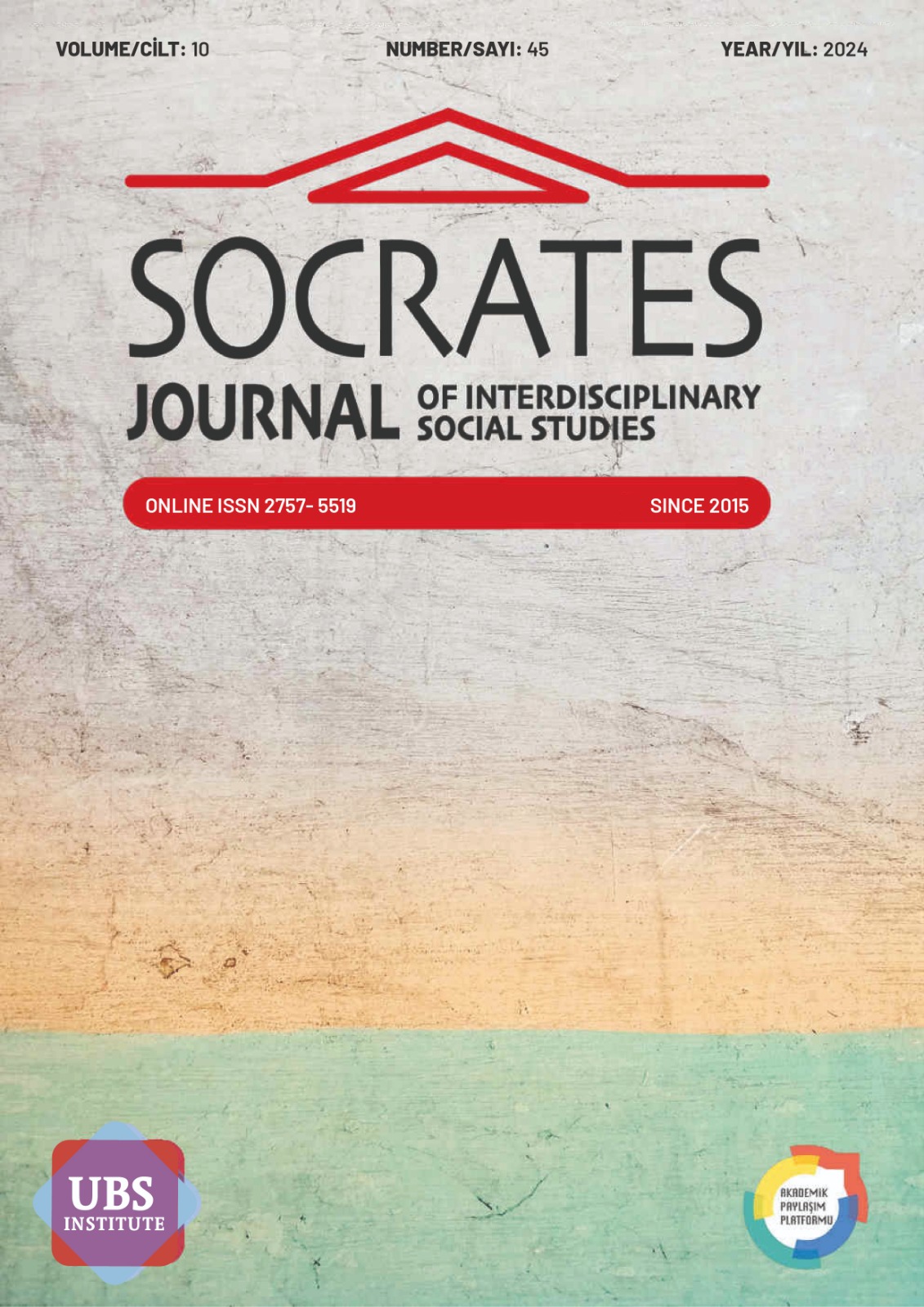EXAMINATION OF TEACHERS’ OPINIONS ON ACCOUNTABILITY OF SCHOOL PRINCIPALS
OKUL MÜDÜRLERİNİN HESAP VEREBİLİRLİĞİNE İLİŞKİN ÖĞRETMEN GÖRÜŞLERİNİN İNCELENMESİ
DOI:
https://doi.org/10.5281/zenodo.13854303Anahtar Kelimeler:
Accountability, School Principal, TeacherÖzet
In this study, it is aimed to determine the level of teachers' views on the accountability of school principals. In order to achieve the stated purpose, the survey model, one of the quantitative research methods, was preferred as a method. In the research, cross-sectional survey model was preferred because it gives the opportunity to measure the variable whose characteristics are given among these types at one time. The population of the study consists of teachers working at various educational levels. The sample of the research consists of 325 teachers who were determined by ‘Simple Random Sampling’ method among the teachers working at various educational levels. Two data collection tools were used to collect data in the study. The first one is ‘Personal Information Form’ to learn the personal information of the teachers and the second one is ‘Accountability Practices Scale’. Since the data showed normal distribution in the study, parametric tests were used for data analysis. In the study, it was determined that teachers‘ perceptions of school principals’ accountability practices were at the level of ‘Agree’ in the sub-dimensions of ‘Responsibility’ and ‘Provision’; at the level of ‘Somewhat Agree’ in the sub-dimensions of ‘Standards’, ‘Transparency’ and ‘Questioning’; and the general perceptions of teachers about accountability were at the level of ‘Somewhat Agree’. In addition, it was determined that the perceptions of the teachers who participated in the study showed a significant difference according to the variables of gender, educational level and working time with the principal in the school, while it was determined that there was no significant difference according to the variable of professional seniority.
Referanslar
Aktan, C., Ağcakaya, S., & Dileyici, D. (2004). Kamu maliyesinde hesap verme sorumluluğu ve mali saydamlık. A. Balcı, A. Nohutçu, N. K. Öztürk, B. Coşkun. (Editör), Kamu Maliyesinde Çağdaş Yaklaşımlar. Ankara: Seçkin Yayınları.
Arcagök, M. S. ve Erüz, E. (2006). Kamu mali yönetimi ve kontrol sistemi. Ankara: Maliye Hesap Uzmanları Derneği Yayınları.
Barber, M. (2004). The virtue of accountability: System redesign, ınspection and incentives in the era of informed professionalism. Journal of Education, 185(1), 7-8.
Berryhill, J., Linney, J. A., & Fromewick, J. (2009). The effects of education accountability on teachers? Are policies too stress provoking for their own good? International Journal Of Education Policy And Leadership, 4(5), 1-14.
Bilgin, K. U. (2004). Kamu performans yönetimi. Ankara: TODAİE Yayınları.
Brennan N. M., & Solomon, J. (2008).Corporate governance, accountability and mechanisms of accountability: An overview. Accounting Auditing and Accountability Journal, 21(7), 885-906.
Bülbül, M. (2011). Türk milli eğitim sisteminde hesap verebilirlik. Doktora Tezi, Gazi Üniversitesi, Ankara
Büyüköztürk, Ş., Kılıç Çakmak, E., Akgün, Ö.E, Karadeniz, Ş., & Demirel, F. (2020). Eğitimde bilimsel araştırma yöntemleri (28. Baskı). Pegem Akademi.
Cohen, J., Krishnamoorty, G., & Wright, A. (2004). Corporate governance mosaic and financial reporting quality. Journal of Accounting Literature, 87-152.
Dinç, E., & Abdioğlu, H. (2009). İşletmelerde Kurumsal Yönetim Anlayışı ve Muhasebe Bilgi Sistemi İlişkişi: İMKB-100 Şirketleri Üzerine Ampirik Bir Araştırma. Balıkesir Sosyal Bilimler Enstitüsü Dergisi, 12(21), 157-184.
Donnelly, L. A., & Sadler, T. D. (2009). High school science teachers’ views of standards and accountability. Science Education, 93(6), 1050-1075.
Fullan, M. (1991). The new meaning of educatioanal change. London: Cassell.
Gürbüz, A. O. ve Ergincan, Y. (2004). Kurumsal yönetim: Türkiye’deki durumu ve geliştirilmesine yönelik öneriler. İstanbul: Literatür Yayıncılık.
Gürbüz, S., & Şahin, F. (2017). Sosyal bilimlerde araştırma yöntemleri. Ankara: Seçkin.
Healy, P. M. ve Palepu, K. G. (2001). Information asymmetry, corporate disclosure, and the capital markets: Ariview of the empirical disclosure literature. Journal of Accounting Economics, 31(1-3), 405-440.
Kantos, Z. E. ve Balcı, A. (2010). İlköğretim okulu yönetici ve öğretmenlerinin görüşlerine göre kamu ve özel ilköğretim okulları için bir hesap verebilirlik modeli. Doktora tezi, Ankara Üniversitesi, Ankara.
Kesim, E. (2005). Bir etik davranış ilkesi olarak hesap verebilirlik (hesap verme sorumluluğu). Siyasette ve Yönetimde Etik Sempozyumu, Sakarya Üniversitesi, Adapazarı.
Luo, Y. (2005). Corporate governance and accountability in multinational enterprises: Concepts and agenda. Journal of International Mangement, 11, 1-18.
Suyolcu, O. A. (2006). Yönetişim mekanizmalarının kurumsal açıklamalar ve finansal raporlamalar üzerindeki etkisi. Yüksek Lisans Tezi, Dokuz Eylül Üniversitesi, İzmir.
Tabachnick, B.G., & Fidell, L.S. (2013). Using multivariate statistics. (6. edition). Pearson Education.
Torres, L. (2004). Accounting and accountability: Recent developments in goverment financial information system. Public Administration and Development, 24, 447-456
Uyar, S. (2004). Kurumsal şeffaflığın sağlanmasında kurumsal yönetim (corporate governance) anlayışının önemi. Mali Çözüm Dergisi, 66, 155.
İndir
Yayınlanmış
Nasıl Atıf Yapılır
Sayı
Bölüm
Lisans
Telif Hakkı (c) 2024 Socrates Journal of Interdisciplinary Social Studies

Bu çalışma Creative Commons Attribution 4.0 International License ile lisanslanmıştır.


